反意疑问句课件
文档属性
| 名称 | 反意疑问句课件 |
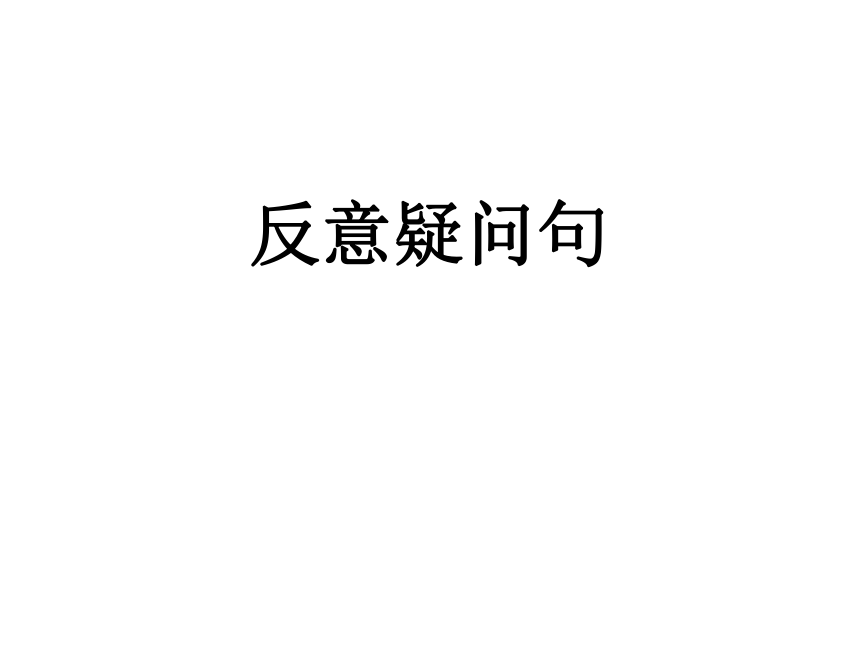
|
|
| 格式 | zip | ||
| 文件大小 | 1.3MB | ||
| 资源类型 | 教案 | ||
| 版本资源 | 人教新目标(Go for it)版 | ||
| 科目 | 英语 | ||
| 更新时间 | 2017-11-27 00:00:00 | ||
图片预览

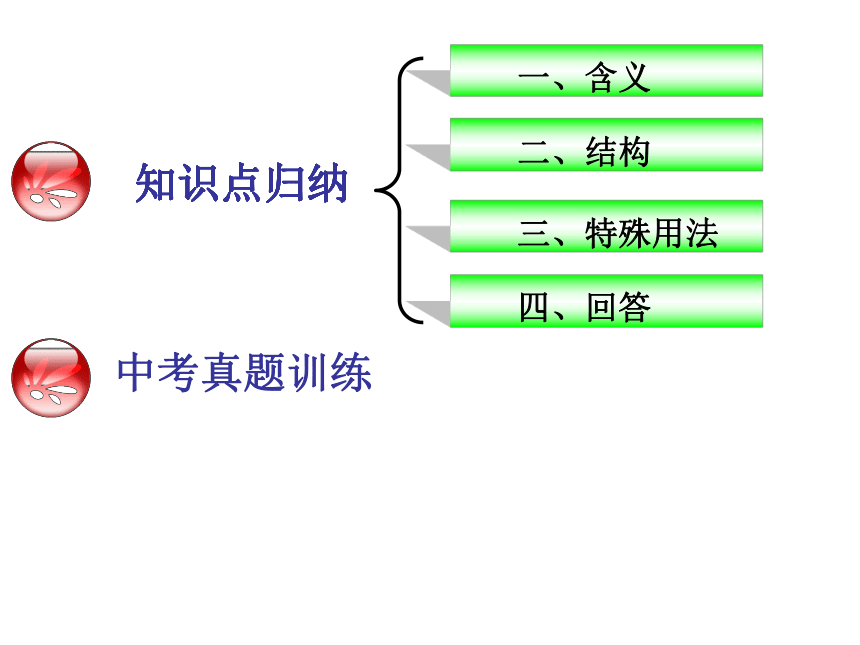
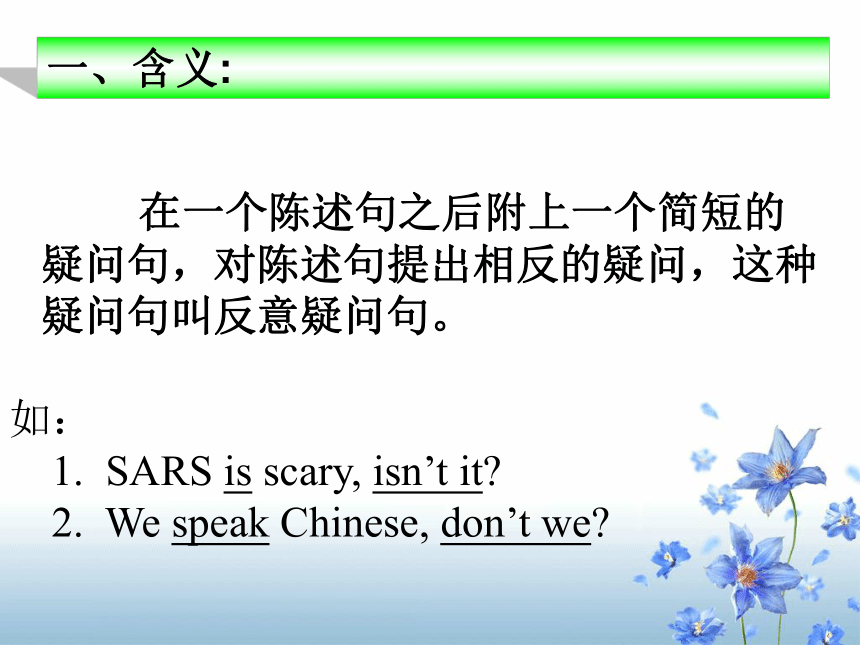
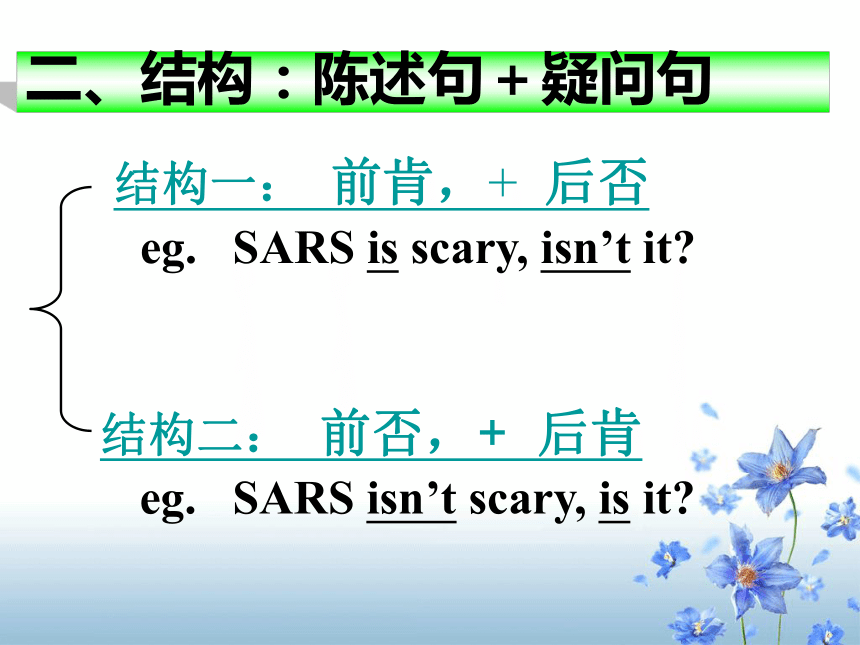
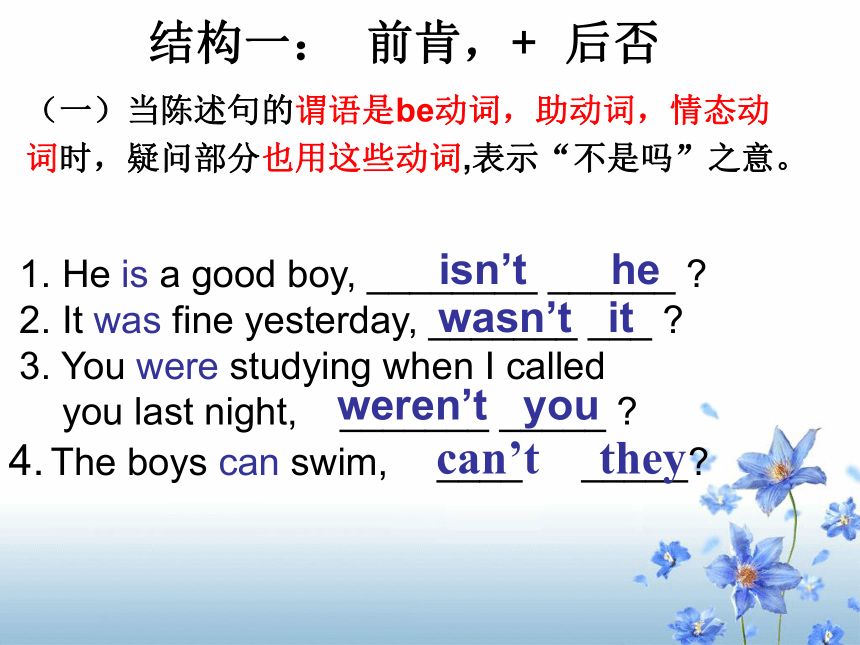
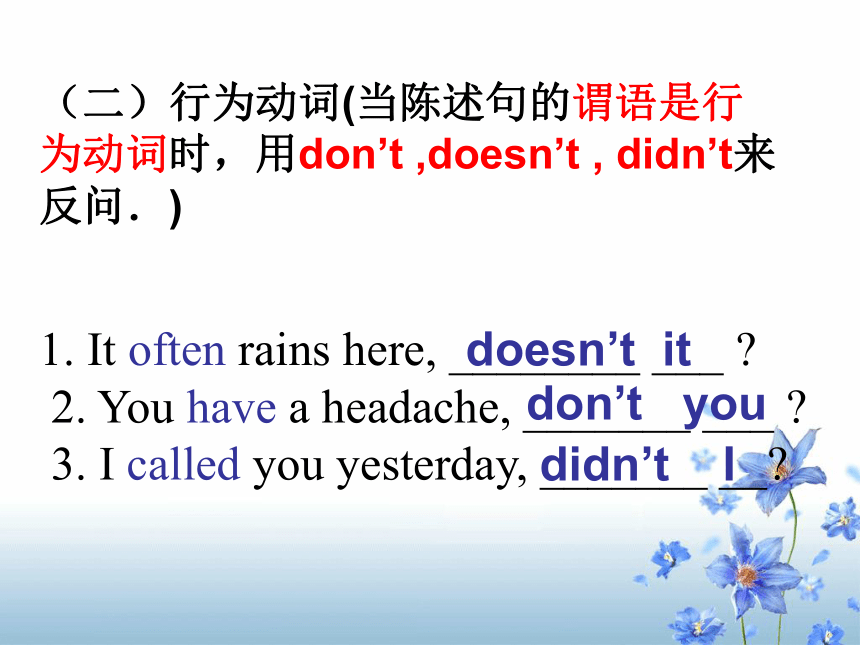
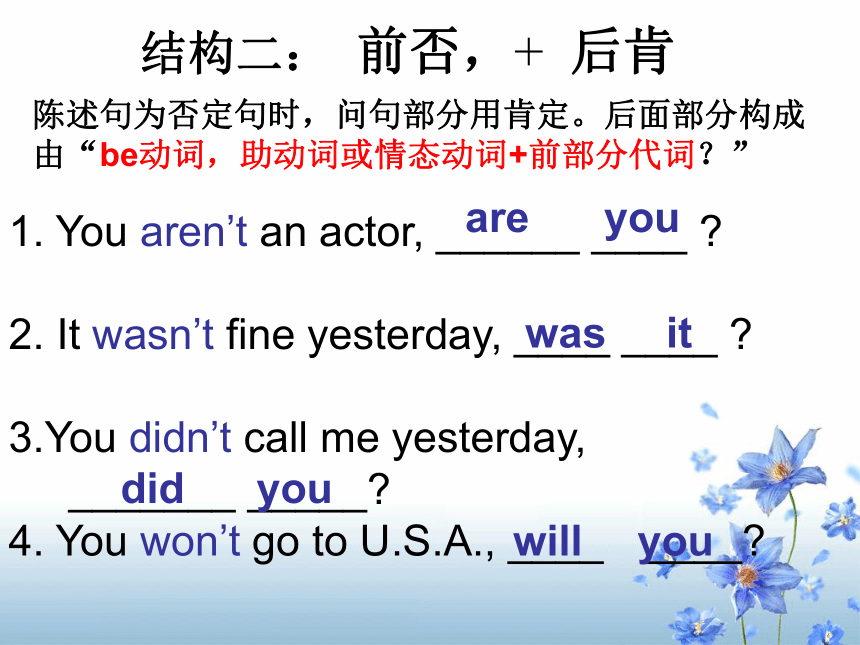
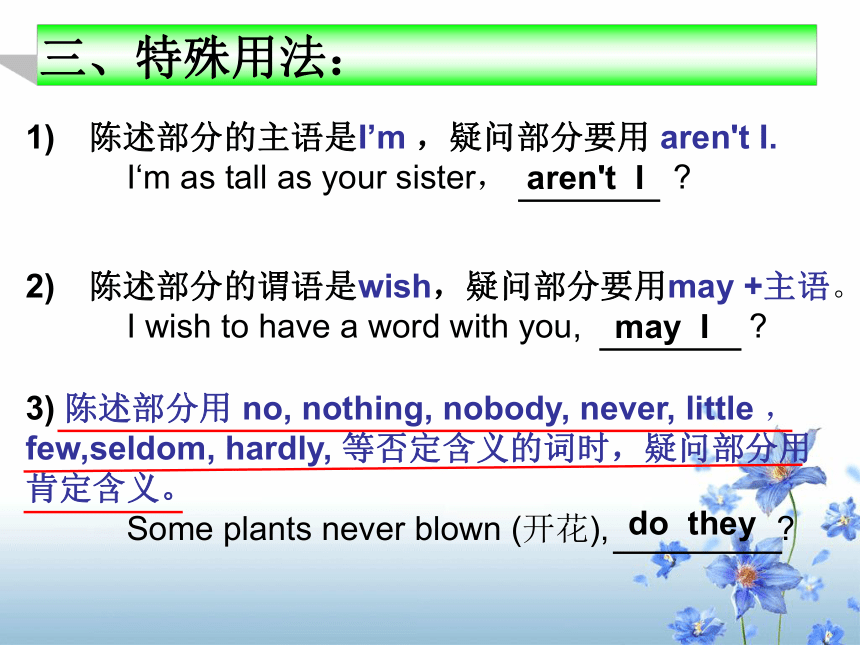
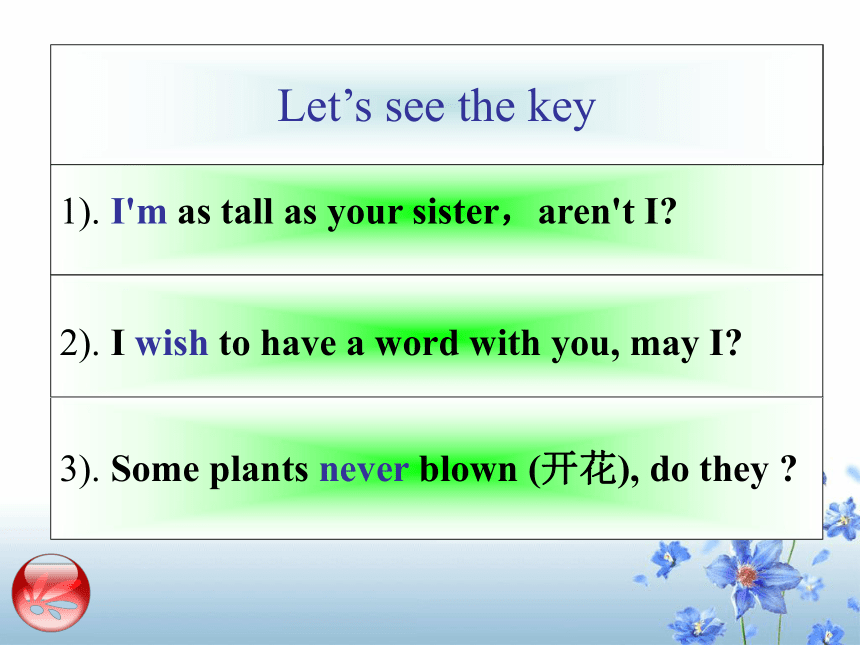
文档简介
课件21张PPT。反意疑问句知识点归纳 一、含义 二、结构 三、特殊用法 四、回答 知识点归纳知识点归纳知识点归纳知识点归纳中考真题训练知识点归纳一、含义:
在一个陈述句之后附上一个简短的疑问句,对陈述句提出相反的疑问,这种疑问句叫反意疑问句。
如:
1. SARS is scary, isn’t it?
2. We speak Chinese, don’t we?结构一: 前肯,+ 后否
eg. SARS is scary, isn’t it?结构二: 前否,+ 后肯
eg. SARS isn’t scary, is it?二、结构:陈述句+疑问句 1. You are an actor, ________ _____ ?
2. He is a good boy, ________ ______ ?
3. I am Chinese, ______ ____?
4. It was fine yesterday, _______ ___ ?
5. You were studying when I called
you last night, _______ _____ ?
6 . The boys can swim,___________?
7. Your father will be back in a week,
1. He is a good boy, ________ ______ ?
2. It was fine yesterday, _______ ___ ?
3. You were studying when I called
you last night, _______ _____ ?
4. The boys can swim, ____ _____?结构一: 前肯,+ 后否 (一)当陈述句的谓语是be动词,助动词,情态动词时,疑问部分也用这些动词,表示“不是吗”之意。 isn’t he weren’t you wasn’t it can’t they1. It often rains here, ________ ___ ?
2. You have a headache, _______ ___ ?
3. I called you yesterday, _______ __? doesn’t it don’t you didn’t I(二)行为动词(当陈述句的谓语是行为动词时,用don’t ,doesn’t , didn’t来反问.) 结构二: 前否,+ 后肯
陈述句为否定句时,问句部分用肯定。后面部分构成由“be动词,助动词或情态动词+前部分代词?”1. You aren’t an actor, ______ ____ ?
2. It wasn’t fine yesterday, ____ ____ ?
3.You didn’t call me yesterday,
_______ _____?
4. You won’t go to U.S.A., ____ ____? was itdid you are youwill you1) 陈述部分的主语是I’m ,疑问部分要用 aren't I.
I‘m as tall as your sister, ?2) 陈述部分的谓语是wish,疑问部分要用may +主语。
I wish to have a word with you, ?3) 陈述部分用 no, nothing, nobody, never, little ,few,seldom, hardly, 等否定含义的词时,疑问部分用肯定含义。
Some plants never blown (开花), ?三、特殊用法:aren't Imay Ido theyLet’s see the key3). Some plants never blown (开花), do they ?Let’s see the key1). I'm as tall as your sister,aren't I?
2). I wish to have a word with you, may I?
Let’s see the keyLet’s see the key6)陈述部分由neither… nor, either… or 连接的并列主语时,疑问部分 根据其实际逻辑意义而定。
Neither you nor I am engineer, ?5) 陈述部分有must 的疑问句,疑问部分根据实际情况而定。
He must be a doctor, ?
You must have studied English for three years, ?4)陈述部分有have to +v. (had to + v.),疑问部分常用don’t +主语(didn‘t +主语)。
We have to get there at eight tomorrow, ?don't wehaven't you? /didn't youisn't heare we. 5)He must be a doctor, isn't he?
You must have studied English for three years, haven't you? /didn't you?
Let’s check up!4)We have to get there at eight tomorrow,
don't we?6) Neither you nor I am engineer, are we?8)陈述部分主句谓语是think, believe, expect, suppose, imagine等引导的宾语从句,疑问部分与宾语从句相对应构成反意疑问句。
I don't think he is bright, ?
We believe she can do it better, ?7)陈述部分主语是指示代词或不定代词everything, that, nothing, this, 疑问部分主语用it。
Everything is ready, ?9) 陈述部分是“there be”结构的,疑问部分用
“助动词+ there”。
There is something wrong with your watch, ?
There will not be any trouble, ?isn't itis hecan't sheisn't therewill there7). Everything is ready, isn't it?
Let’s see the key8)I don't think he is bright, is he?
We believe she can do it better, can't she?9)There is something wrong with your watch, isn't there?
There will not be any trouble, will there?10)省去主语的祈使句的反意疑问句,疑问部分用will you。
Don't do that again, ?
Go with me ?
注意: Let's 开头的祈使句,后用shall we?
Let us 开头的祈使句,后用will you?
Let's go and listen to the music, ?
Let us wait for you in the reading-room, ?11) 否定前缀不能视为否定词,其反意疑问句仍用否定形式。
It is impossible, ?
He is not unkind to his classmates, ? 12) must在表"推测"时,根据其推测的情况来确定反意疑问句。
He must be there now, ?
It must be going to rain tomorrow, ?will youwill you / won't youshall wewill youisn't itis heisn't hewon't it10)Don't do that again, will you?
Go with me, will you / won't you ?
Let's go and listen to the music, shall we?
Let us wait for you in the reading-room, will you ?
Let’s check up!11)It is impossible, isn't it?
He is not unkind to his classmates, is he?
12)He must be there now, isn't he?
It must be going to rain tomorrow, won't it?1、The girls like listening to popular music,______________?
这些女孩喜欢听流行音乐,不是吗?
肯定回答:______________.是的,她们喜欢。
否定回答:______________.不,她们不喜欢。don’t theyYes, they doNo, they don’t2、You haven’t eaten anything,_____________?
你还没有吃过什么东西,是吗?
肯定回答:________________不,我已吃过了。
否定回答:______________是,我还没有吃过。have youYes, I haveNo, I haven’t注意:对前一部分为否定后部分为肯定的反意疑问句的回答恰好与汉语相反。这时,为与汉语一致,我们相应地把“Yes”译为“不”,而把“No”译为“是的”。同时记住,没有类似“Yes, I haven’t”或“No, I have”这种汉语式的回答。四、反意疑问句的回答,分为肯定回答和否定回答- Haven’t you ever studied with a group?
-______, I’ve learned a lot that way.
Yes, I have No, I haven’t
Yes, I did No, I didn’t真题训练:There were few new words in the English competition for your daughter, _______ ?The students don’t have much time to play with their friends,____ ____ ?(改为反意疑问句) were there weren’t there aren’t thereare theredo they6、-You haven’t ever been to Beichuan, have you?
-________ ,This is the first time.
Yes ,I have Yes, I haven’t
No, I have No, I haven’tThe air is fresh outside. Let’s go and take a walk,_____?
will you shall we don’t you aren’t youE-mail is very popular today.people seldom write letters now,_______?
did they do they didn't they don't they小结:1. I’m a student who have my own dreams, aren’t I? 2.I don’t think I’m a very industrious student,am I?3.He made no answer when asked by the teacher,did he?4.We have to finish the paper in two hours,don’t we?6.I must finish the work in such a short time,mustn’t I?7.He must have finished his homework yesterday,didn’t he?9.Nothing has been left ,has it?5.Don’t mention it again, will you?8.Let’s see what the teacher says about this,shall we?10.He is not unkind to his classmates,is he?HOMEWORK:Do some exercises!
在一个陈述句之后附上一个简短的疑问句,对陈述句提出相反的疑问,这种疑问句叫反意疑问句。
如:
1. SARS is scary, isn’t it?
2. We speak Chinese, don’t we?结构一: 前肯,+ 后否
eg. SARS is scary, isn’t it?结构二: 前否,+ 后肯
eg. SARS isn’t scary, is it?二、结构:陈述句+疑问句 1. You are an actor, ________ _____ ?
2. He is a good boy, ________ ______ ?
3. I am Chinese, ______ ____?
4. It was fine yesterday, _______ ___ ?
5. You were studying when I called
you last night, _______ _____ ?
6 . The boys can swim,___________?
7. Your father will be back in a week,
1. He is a good boy, ________ ______ ?
2. It was fine yesterday, _______ ___ ?
3. You were studying when I called
you last night, _______ _____ ?
4. The boys can swim, ____ _____?结构一: 前肯,+ 后否 (一)当陈述句的谓语是be动词,助动词,情态动词时,疑问部分也用这些动词,表示“不是吗”之意。 isn’t he weren’t you wasn’t it can’t they1. It often rains here, ________ ___ ?
2. You have a headache, _______ ___ ?
3. I called you yesterday, _______ __? doesn’t it don’t you didn’t I(二)行为动词(当陈述句的谓语是行为动词时,用don’t ,doesn’t , didn’t来反问.) 结构二: 前否,+ 后肯
陈述句为否定句时,问句部分用肯定。后面部分构成由“be动词,助动词或情态动词+前部分代词?”1. You aren’t an actor, ______ ____ ?
2. It wasn’t fine yesterday, ____ ____ ?
3.You didn’t call me yesterday,
_______ _____?
4. You won’t go to U.S.A., ____ ____? was itdid you are youwill you1) 陈述部分的主语是I’m ,疑问部分要用 aren't I.
I‘m as tall as your sister, ?2) 陈述部分的谓语是wish,疑问部分要用may +主语。
I wish to have a word with you, ?3) 陈述部分用 no, nothing, nobody, never, little ,few,seldom, hardly, 等否定含义的词时,疑问部分用肯定含义。
Some plants never blown (开花), ?三、特殊用法:aren't Imay Ido theyLet’s see the key3). Some plants never blown (开花), do they ?Let’s see the key1). I'm as tall as your sister,aren't I?
2). I wish to have a word with you, may I?
Let’s see the keyLet’s see the key6)陈述部分由neither… nor, either… or 连接的并列主语时,疑问部分 根据其实际逻辑意义而定。
Neither you nor I am engineer, ?5) 陈述部分有must 的疑问句,疑问部分根据实际情况而定。
He must be a doctor, ?
You must have studied English for three years, ?4)陈述部分有have to +v. (had to + v.),疑问部分常用don’t +主语(didn‘t +主语)。
We have to get there at eight tomorrow, ?don't wehaven't you? /didn't youisn't heare we. 5)He must be a doctor, isn't he?
You must have studied English for three years, haven't you? /didn't you?
Let’s check up!4)We have to get there at eight tomorrow,
don't we?6) Neither you nor I am engineer, are we?8)陈述部分主句谓语是think, believe, expect, suppose, imagine等引导的宾语从句,疑问部分与宾语从句相对应构成反意疑问句。
I don't think he is bright, ?
We believe she can do it better, ?7)陈述部分主语是指示代词或不定代词everything, that, nothing, this, 疑问部分主语用it。
Everything is ready, ?9) 陈述部分是“there be”结构的,疑问部分用
“助动词+ there”。
There is something wrong with your watch, ?
There will not be any trouble, ?isn't itis hecan't sheisn't therewill there7). Everything is ready, isn't it?
Let’s see the key8)I don't think he is bright, is he?
We believe she can do it better, can't she?9)There is something wrong with your watch, isn't there?
There will not be any trouble, will there?10)省去主语的祈使句的反意疑问句,疑问部分用will you。
Don't do that again, ?
Go with me ?
注意: Let's 开头的祈使句,后用shall we?
Let us 开头的祈使句,后用will you?
Let's go and listen to the music, ?
Let us wait for you in the reading-room, ?11) 否定前缀不能视为否定词,其反意疑问句仍用否定形式。
It is impossible, ?
He is not unkind to his classmates, ? 12) must在表"推测"时,根据其推测的情况来确定反意疑问句。
He must be there now, ?
It must be going to rain tomorrow, ?will youwill you / won't youshall wewill youisn't itis heisn't hewon't it10)Don't do that again, will you?
Go with me, will you / won't you ?
Let's go and listen to the music, shall we?
Let us wait for you in the reading-room, will you ?
Let’s check up!11)It is impossible, isn't it?
He is not unkind to his classmates, is he?
12)He must be there now, isn't he?
It must be going to rain tomorrow, won't it?1、The girls like listening to popular music,______________?
这些女孩喜欢听流行音乐,不是吗?
肯定回答:______________.是的,她们喜欢。
否定回答:______________.不,她们不喜欢。don’t theyYes, they doNo, they don’t2、You haven’t eaten anything,_____________?
你还没有吃过什么东西,是吗?
肯定回答:________________不,我已吃过了。
否定回答:______________是,我还没有吃过。have youYes, I haveNo, I haven’t注意:对前一部分为否定后部分为肯定的反意疑问句的回答恰好与汉语相反。这时,为与汉语一致,我们相应地把“Yes”译为“不”,而把“No”译为“是的”。同时记住,没有类似“Yes, I haven’t”或“No, I have”这种汉语式的回答。四、反意疑问句的回答,分为肯定回答和否定回答- Haven’t you ever studied with a group?
-______, I’ve learned a lot that way.
Yes, I have No, I haven’t
Yes, I did No, I didn’t真题训练:There were few new words in the English competition for your daughter, _______ ?The students don’t have much time to play with their friends,____ ____ ?(改为反意疑问句) were there weren’t there aren’t thereare theredo they6、-You haven’t ever been to Beichuan, have you?
-________ ,This is the first time.
Yes ,I have Yes, I haven’t
No, I have No, I haven’tThe air is fresh outside. Let’s go and take a walk,_____?
will you shall we don’t you aren’t youE-mail is very popular today.people seldom write letters now,_______?
did they do they didn't they don't they小结:1. I’m a student who have my own dreams, aren’t I? 2.I don’t think I’m a very industrious student,am I?3.He made no answer when asked by the teacher,did he?4.We have to finish the paper in two hours,don’t we?6.I must finish the work in such a short time,mustn’t I?7.He must have finished his homework yesterday,didn’t he?9.Nothing has been left ,has it?5.Don’t mention it again, will you?8.Let’s see what the teacher says about this,shall we?10.He is not unkind to his classmates,is he?HOMEWORK:Do some exercises!
同课章节目录
- 词法
- 名词
- 动词和动词短语
- 动词语态
- 动词时态
- 助动词和情态动词
- 非谓语动词
- 冠词
- 代词
- 数词和量词
- 形容词副词及其比较等级
- 介词和介词短语
- 连词和感叹词
- 构词法
- 相似、相近词比较
- 句法
- 陈述句
- 一般疑问句和否定疑问句
- 特殊疑问句及选择疑问句
- 反意疑问句
- 存在句(There be句型)
- 宾语从句
- 定语从句
- 状语从句
- 主谓一致问题
- 简单句
- 并列句
- 复合句
- 主谓一致
- 主、表语从句
- 名词性从句
- 直接引语和间接引语
- 虚拟语气
- 感叹句
- 强调句
- 倒装句
- 祈使句
- 句子的成分
- 句子的分类
- 题型专区
- 单项选择部分
- 易错题
- 完形填空
- 阅读理解
- 词汇练习
- 听说训练
- 句型转换
- 补全对话
- 短文改错
- 翻译
- 书面表达
- 任务型阅读
- 语法填空
- 其他资料
